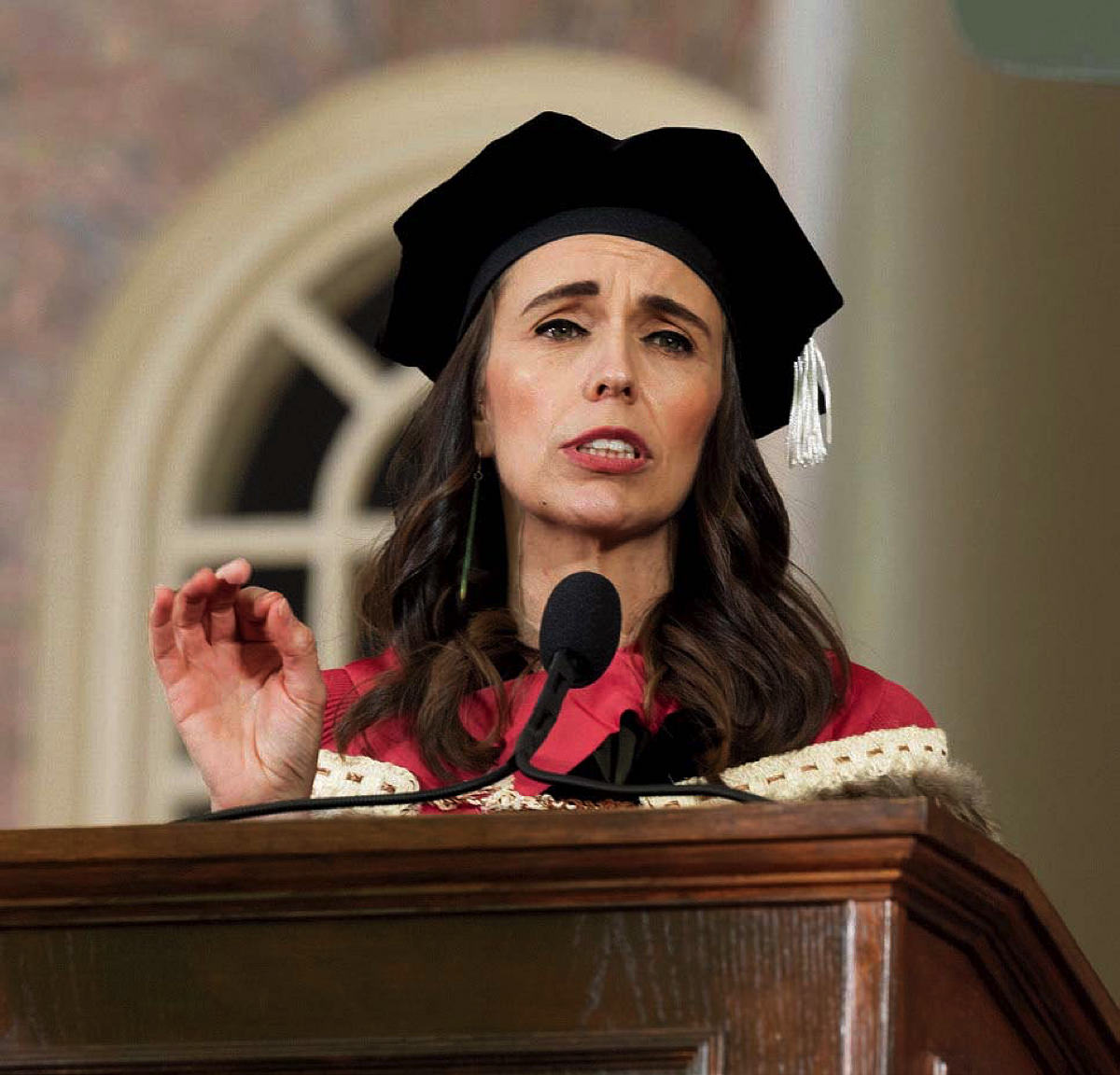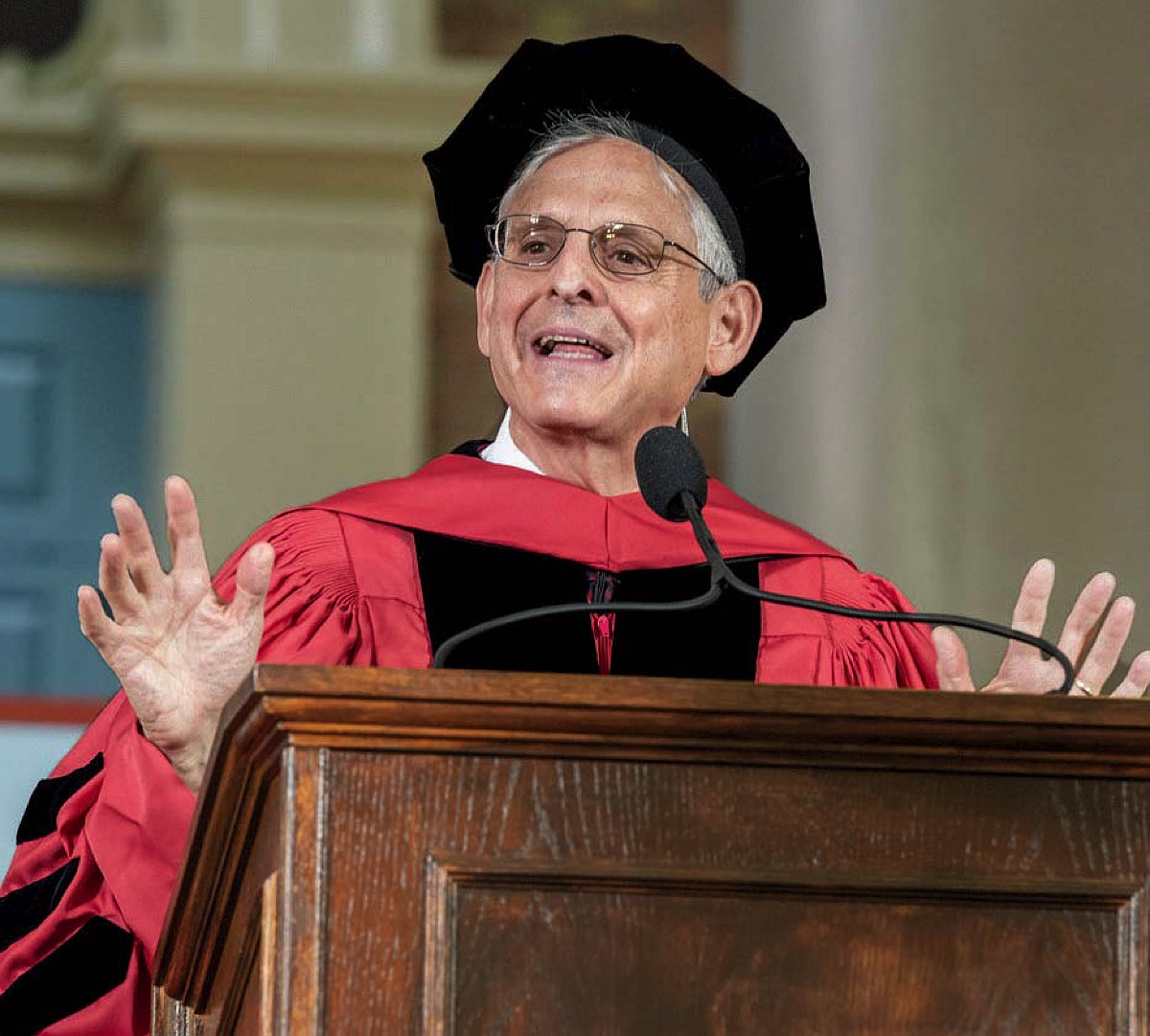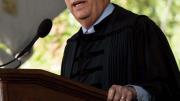“Save a Seat for Others”
During his welcoming remarks at the 371st Commencement, on May 26, President Lawrence S. Bacow drew on pandemic-influenced conditions to send a message about the candidates’ future comportment, and truths not always associated with Veritas.
Something very inconvenient happens when you combine a nation’s worth of graduations with a global supply-chain shortage.
There are not enough folding chairs to go around.
I am not kidding—half of you almost had to sit on blankets today.…
Fortunately…our amazing staff…are creative, resilient, and resourceful. So now you know about the Great Seat Scramble of 2022.
I am telling you this because it is likely the last time you almost didn’t get a seat. Soon you will have a degree in hand from an institution whose name is known no matter where you go in the world, whose name is synonymous with excellence, ambition, and achievement—and maybe some other modifiers on which we needn’t dwell today.
With your degree…you may often find yourself invited to sit and stay awhile, invited to share your thoughts and ideas, invited to participate, to contribute, to lead. You may end up sitting on a board or occupying a seat of power.…
And what are you to make of that—of the fact that people will make room for you, find a seat for you?
You could take it for granted. You could assume that you deserved it all along.
But what a waste that would be.
Today, I want to challenge you—members of the Harvard class of 2022—to save a seat for others, to make room for others, to ensure that the opportunities afforded by your education do not enrich your life alone. You will have more chances than most to make a difference in the world, more opportunities to give others a chance at a better life. Take advantage of these opportunities when they arise. Whatever you do with your Harvard education, please be known at least as much for your humility, kindness, and concern for others as for your professional accomplishments. Recognize the role that good fortune and circumstance have played in your life, and please work to extend opportunity to others just as it has been extended to you.
That is how you will sustain the pride and joy you feel today. And that’s the truth.
“Let Us Reclaim the Space in Between”

The Right Honourable Jacinda Ardern, Prime Minister of New Zealand
Citing the Commencement address by Benazir Bhutto ’73, LL.D. ’89, then prime minister of Pakistan, this year’s guest speaker, Prime Minister Jacinda Ardern, LL.D. ’22, recalled her warning that “democracy…can be fragile.” Ardern then explained:
This imperfect but precious way that we organize ourselves, that has been created to give equal voice to the weak and to the strong, that is designed to help drive consensus—it is fragile.
For years it feels as though we have assumed that the fragility of democracy was determined by duration. That somehow the strength of your democracy was like a marriage—the longer you’d been in it, the more likely it was to stick.
But that takes so much for granted.
It ignores the fact that the foundation of a strong democracy includes trust in institutions, experts, and government—and that this can be built up over decades but torn down in mere years.
It ignores that a strong democracy relies on debate and dialogue, and that even the oldest regimes can seek to control these forums, and the youngest can seek to liberate them.
It ignores what happens, when regardless of how long your democracy has been tried and tested—when facts are turned into fiction, and fiction turned into fact, you stop debating ideas and you start debating conspiracy.
It ignores the reality of what we are now being confronted by every single day.
Ardern recalled growing up in a rural town of 5,000 where “I lived in that important space that sits between difference and division.” She was “raised a Mormon in a town where the dominant religions were Catholic, Anglican, and Rugby. I was a woman interested in…left-wing politics, in a region that had never in its entire democratic history, elected anyone other than a conservative candidate.” Yet those differences were “a part of my identity, but never a source of isolation.” But now, in an era of social media, she said:
[A]s the opportunities to connect expanded, humans did what we have always done. We organised ourselves.…
We logged on in our billions, forming tribes and sub tribes. We published our thoughts, feelings, and ideas freely. We found a place to share information, facts, fiction dressed up as facts, memes, and more cat videos than you ever thought possible.
We found a place to experience new ways of thinking and to celebrate our difference.
But increasingly, we use it to do neither of those things.
I doubt anyone has ever created a group titled “political views I disagree with, but choose to enter into respectful dialogue with to better understand alternative perspectives.”
As humans, we are naturally predisposed to reinforce our own views, to gather with people like us and avoid the dreaded sense of cognitive dissonance. We seek validation, confirmation, reinforcement. And increasingly with the help of algorithms, what we seek, we are served, sometimes before we even know we’re looking.
Accordingly:
The time has come for social media companies and other online providers to recognise their power and to act on it.
That means upholding their own basic terms of service.
That means recognising the role they play in constantly curating and shaping the online environments that we’re in. That algorithmic processes make choices and decisions for us—what we see and where we are directed —and that at best this means the user experience is personalised and at worst it means it can be radicalised.
It means, that there is a pressing and urgent need for responsible algorithm development and deployment.
We have the forums for online providers and social media companies to work on these issues alongside civil society and governments. And we have every reason to do it…because the time has come.
At the same time, she told the graduates not to “overlook the impact of simple steps that are right in front of us”:
To make a choice to treat difference with empathy and kindness.
Those values that exist in the space between difference and division. The very things we teach our children, but then view as weakness in our leaders.
The issues we navigate as a society will only intensify. The disinformation will only increase. The pull into the comfort of our tribes will be magnified. But we have it within us to ensure that this doesn’t mean we fracture.
We are the richer for our difference, and poorer for our division. Through genuine debate and dialogue, through rebuilding trust in information and one another, through empathy—let us reclaim the space in between.
Read the full address at harvardmag.com/371-ardern-22.
“The Urgent Need to Defend Democracy”

U.S. Attorney General Merrick Garland
Speaking at the May 29 celebration for the classes of 2020 and 2021, U.S. Attorney General Merrick Garland ’74, J.D. ’77 (who declined an honorary degree, in light of his current responsibilities), talked seriously about what citizens owe one another at a time of rising political violence and threats of violence, unwillingness to accept the peaceful transfer of power, and acts of racially motivated terrorism and mass murders.
There is one particular reason that makes my call to public service especially urgent for your generation. It is an urgency that should move each of you, regardless of the career you choose. It is the urgent need to defend democracy.
Both at home and abroad, we are seeing the many ways in which democracy is under threat.
I want to start with democracy abroad, as I am well aware of the international students in this audience.…
When I was graduating from college, there were many things to worry about in the outside world, including the threat of another land war in Europe. But with the fall of the Berlin Wall in 1989, that threat seemed to recede from the possible to the improbable.
Now that land war is upon us. Russia’s unprovoked and unjust invasion of Ukraine this February has been accompanied by heartbreaking atrocities…
[I]f anything can pull us together as a country and as an international community—and make clear the stake we all have in the success of democracy both at home and abroad—this heinous invasion by an authoritarian government is it.
At home, we are also facing threats to democracy—different in kind, but threats, nonetheless.
We see them in efforts to undermine the right to vote.
We see them in the violence and threats of violence that are directed at people because of who they are or how they serve the public.
We saw them when a violent mob stormed the United States Capitol in an attempt to prevent the peaceful transfer of power.
First, I want to talk about the right to vote.
Shortly before I started high school, Congress passed the Voting Rights Act of 1965, thanks to the persistent calls to action of the Civil Rights Movement. That Act gave the Justice Department important tools to protect the cornerstone of our democracy—the right of all eligible citizens to vote.
But while many of you were in high school, the Supreme Court significantly weakened those protections. And while you were in college or graduate school, Court decisions weakened them even further.
Following those decisions, there has been a dramatic increase in legislative efforts that make it harder for millions of eligible voters to vote and to elect representatives of their own choice.
Those efforts threaten the foundation of our system of government. And there may be worse to come.
Some have even suggested giving state legislatures the power to set aside the choice of the voters themselves.
That is not the way a representative democracy is supposed to work.
As I said before, when I was sitting where you are sitting today, there were many things to worry about. But it never occurred to me that the right to vote would again be threatened in this country.
Garland also spoke about the threats against public officials, and the January 6, 2021, attempt to disrupt Congress as it met to certify the Electoral College vote. “Like the threat to voting rights, this kind of direct attack on an American institution is something I never worried about as I was graduating from college,” he said. “There had been such attacks on foreign capitals in foreign lands. But a storming of the U.S. Capitol itself had not taken place since the War of 1812.” As the Department of Justice defends democracy, he continued, it cannot proceed alone. Beyond exhorting the recent graduates to pursue public service, he said:
Finally, the preservation of democracy requires our willingness to tell the truth. Together, we must ensure that the magnitude of an event like January 6th is not downplayed or understated. The commitment to the peaceful transfer of power must be respected by every American. Our democracy depends upon it.
Read the full address at harvardmag.com/comm-2021-22.









